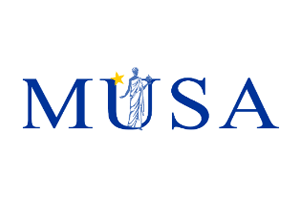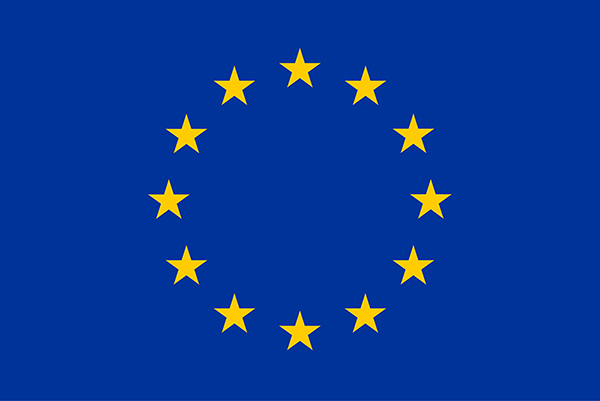
The overall objective of the MUSA project is to assess the capability of SA codes when modelling reactor and SFP accident scenarios of GEN II, GEN III and GEN III+ reactor designs. To do so, UQ methodologies are to be employed, with an emphasis on the effect of both existing and innovative SAM measures on the accident progression, particularly those measures related to the ST mitigation. Therefore, ST-related FOM are to be used in the UQ application.
Consequently, the MUSA project will contribute to the determination of the state-of-the-art prediction capability of SA codes regarding the ST that potentially may be released to the external environment in an SA, and to the quantification of the associated code’s uncertainties applied to SA sequences in both NPPs and SFPs.
The achievement of the overall objective is assured by a consistent and coherent work programme reflected in the technical Work Packages defined as follows:
- Identification and Quantification of Uncertainty Sources
- Review of Uncertainty Methodologies
- Application of UQ Methods against Integral Experiments
- Uncertainty Quantification in Analysis & Management of Reactor Accidents
- Innovative Management of SFP Accidents
Furthermore, the envisaged outcome of the MUSA project will be monitored and measured continuously along the project evolution through specific deliverables and milestones, which are stated hereafter:
- Identification of key SA processes/phenomena affecting the ST and quantification of their associated uncertainties;
- Identification and quantification of key parameters of SAM measures implemented in the SA affectingthe ST, and their associated uncertainties;
- Evaluation of applicable methods of UaSA to the SA field and definition of best UQ application practices in SA analyses;
- Trial of UaSA methodologies against simplified but representative experimental scenarios with heavy emphasis on ST;
- Application of UaSA methodologies to risk-dominant reactor and SFP SA sequences;
- Recommendations for an effective reduction of remaining code uncertainties associated with the ST and their impact on SAM measures;
- Recommendations for improvement and/or new innovative SAM measures for both reactor and SFP
scenarios.
It is worth mentioning that a systematic approach to quantifying the uncertainty of SA codes applied to different reactor designs has never been undertaken before. The MUSA project combines the efforts of a large European community with strategic partnerships with non-European institutions (Canada, USA, Japan, China, and South Korea).Furthermore, the uncertainties associated with SAM measures will, for the first time, be considered when analysing SA sequences of reactor systems and SFPs. In the past, almost no attention was paid to the assessment of SFP SA scenarios and to the development of corresponding mitigation SAM measures.
Finally, a main outcome of the MUSA project will be the estimation of radiological ST of risk-dominant sequences for different reactor types with the associated uncertainty bands.
Kvietimas: NFRP-2018
Bendra projekto vertė: 5 768 452,50 EUR (LEI dalis: 84 800 EUR)
Koordinatorius: CENTRO DE INVESTIGACIONES ENERGETICAS, MEDIOAMBIENTALES Y TECNOLOGICAS-CIEMAT, Ispanija
Partneriai:
- BEL V, Belgija
- COMMISSARIAT A L ENERGIE ATOMIQUE ET AUX ENERGIES ALTERNATIVES, Prancūzija
- CHINA NUCLEAR POWER TECHNOLOGY RESEARCH INSTITUTE Co. Ltd., Kinija
- CANADIAN NUCLEAR SAFETY COMMISSION, Kanada
- AGENZIA NAZIONALE PER LE NUOVE TECNOLOGIE, L’ENERGIA E LO SVILUPPO ECONOMICO SOSTENIBILE, Italija
- LIMITED LIABILITY COMPANY ENERGORISK, Ukraina
- ELECTRIC POWER RESEARCH INSTITUTE INC, Jungtinės Valstijos
- FRAMATOME GMBH, Vokietija
- GESELLSCHAFT FUR ANLAGEN UND REAKTORSICHERHEIT (GRS) gGmbH, Vokietija
- INSTITUTE OF NUCLEAR RESEARCH AND NUCLEAR ENERGY – BULGARIAN ACADEMY OF SCIENCES, Bulgarija
- INSTITUT DE RADIOPROTECTION ET DE SURETE NUCLEAIRE, Prancūzija
- JAPAN ATOMIC ENERGY AGENCY, Japonija
- JRC -JOINT RESEARCH CENTRE- EUROPEAN COMMISSION, Belgija
- KOREA ATOMIC ENERGY RESEARCH INSTITUTE, Pietų Korėja
- KARLSRUHER INSTITUT FUER TECHNOLOGIE, Vokietija
- LIETUVOS ENERGETIKOS INSTITUTAS, Lietuva
- LGI CONSULTING, Prancūzija
- NINE NUCLEAR AND INDUSTRIAL ENGINEERING SRL, Italija
- PAUL SCHERRER INSTITUT, Šveicarija
- STATE ENTERPRISE STATE SCIENTIFIC AND TECHNICAL CENTER FOR NUCLEAR AND RADIATION SAFETY, Ukraina
- TRACTEBEL ENGINEERING, Belgija
- TECHNICAL UNIVERSITY OF SOFIA, Bulgarija
- UNIVERSITA DI PISA, Italija
- UNIVERSITA DEGLI STUDI DI ROMA LA SAPIENZA, Italija
- VYTAUTO DIDZIOJO UNIVERSITETAS, Lietuva
- TEKNOLOGIAN TUTKIMUSKESKUS VTT OY, Suomija
- WOOD NUCLEAR LIMITED, Jungtinė Karalystė
 Projektas finansuojamas EURATOMO branduolinės energijos tyrimų ir mokymų programos lėšomis, dotacijos sutartis Nr. 847441.
Projektas finansuojamas EURATOMO branduolinės energijos tyrimų ir mokymų programos lėšomis, dotacijos sutartis Nr. 847441.
Projekto vykdytojai
| Vardas, pavardė | kabinetas | tel. nr. | el. paštas |
|---|---|---|---|
|
Instituto atstovas |
|||
| Virginijus Vileiniškis | 251-AK | +37037401928 | Virginijus.Vileiniskis@lei.lt |
|
Projekto vykdytojai |
|||
| Tadas Kaliatka | 415-AK | +37037401911 | Tadas.Kaliatka@lei.lt |
| Mantas Povilaitis | 254-AK | +37037401920 | Mantas.Povilaitis@lei.lt |
| Andrius Slavickas | 407-AK | +37037401870 | Andrius.Slavickas@lei.lt |
| Marija Tamoševičiūtė | 319-AK | +37037401927 | Marija.Tamoseviciute@lei.lt |
| Egidijus Urbonavičius | 405/1-AK | +37037401914 | Egidijus.Urbonavicius@lei.lt |
| Mindaugas Valinčius | 255-AK | +37037401922 | Mindaugas.Valincius@lei.lt |
| Aurimas Tonkūnas | |||





